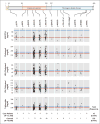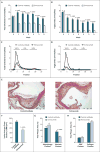Genetic and Pharmacologic Inactivation of ANGPTL3 and Cardiovascular Disease
- PMID: 28538136
- PMCID: PMC5800308
- DOI: 10.1056/NEJMoa1612790
Genetic and Pharmacologic Inactivation of ANGPTL3 and Cardiovascular Disease
Abstract
Background: Loss-of-function variants in the angiopoietin-like 3 gene (ANGPTL3) have been associated with decreased plasma levels of triglycerides, low-density lipoprotein (LDL) cholesterol, and high-density lipoprotein (HDL) cholesterol. It is not known whether such variants or therapeutic antagonism of ANGPTL3 are associated with a reduced risk of atherosclerotic cardiovascular disease.
Methods: We sequenced the exons of ANGPTL3 in 58,335 participants in the DiscovEHR human genetics study. We performed tests of association for loss-of-function variants in ANGPTL3 with lipid levels and with coronary artery disease in 13,102 case patients and 40,430 controls from the DiscovEHR study, with follow-up studies involving 23,317 case patients and 107,166 controls from four population studies. We also tested the effects of a human monoclonal antibody, evinacumab, against Angptl3 in dyslipidemic mice and against ANGPTL3 in healthy human volunteers with elevated levels of triglycerides or LDL cholesterol.
Results: In the DiscovEHR study, participants with heterozygous loss-of-function variants in ANGPTL3 had significantly lower serum levels of triglycerides, HDL cholesterol, and LDL cholesterol than participants without these variants. Loss-of-function variants were found in 0.33% of case patients with coronary artery disease and in 0.45% of controls (adjusted odds ratio, 0.59; 95% confidence interval, 0.41 to 0.85; P=0.004). These results were confirmed in the follow-up studies. In dyslipidemic mice, inhibition of Angptl3 with evinacumab resulted in a greater decrease in atherosclerotic lesion area and necrotic content than a control antibody. In humans, evinacumab caused a dose-dependent placebo-adjusted reduction in fasting triglyceride levels of up to 76% and LDL cholesterol levels of up to 23%.
Conclusions: Genetic and therapeutic antagonism of ANGPTL3 in humans and of Angptl3 in mice was associated with decreased levels of all three major lipid fractions and decreased odds of atherosclerotic cardiovascular disease. (Funded by Regeneron Pharmaceuticals and others; ClinicalTrials.gov number, NCT01749878 .).
Figures




Comment in
-
Dyslipidaemia: ANGPTL3: a therapeutic target for atherosclerosis.Nat Rev Cardiol. 2017 Jun 14;14(7):381. doi: 10.1038/nrcardio.2017.91. Nat Rev Cardiol. 2017. PMID: 28612836 No abstract available.
-
Cardiovascular endocrinology: Is ANGPTL3 the next PCSK9?Nat Rev Endocrinol. 2017 Sep;13(9):503-504. doi: 10.1038/nrendo.2017.88. Epub 2017 Jul 14. Nat Rev Endocrinol. 2017. PMID: 28707678 No abstract available.
-
Increasing Lipolysis and Reducing Atherosclerosis.N Engl J Med. 2017 Jul 20;377(3):280-283. doi: 10.1056/NEJMe1706907. N Engl J Med. 2017. PMID: 28723326 No abstract available.
-
Heart disease: Putative medicines that mimic mutations.Nature. 2017 Aug 31;548(7669):530-531. doi: 10.1038/nature23544. Epub 2017 Aug 23. Nature. 2017. PMID: 28847003 No abstract available.
Similar articles
-
Cardiovascular and Metabolic Effects of ANGPTL3 Antisense Oligonucleotides.N Engl J Med. 2017 Jul 20;377(3):222-232. doi: 10.1056/NEJMoa1701329. Epub 2017 May 24. N Engl J Med. 2017. PMID: 28538111 Clinical Trial.
-
Inhibition of Angiopoietin-Like Protein 3 With a Monoclonal Antibody Reduces Triglycerides in Hypertriglyceridemia.Circulation. 2019 Aug 6;140(6):470-486. doi: 10.1161/CIRCULATIONAHA.118.039107. Epub 2019 Jun 27. Circulation. 2019. PMID: 31242752 Free PMC article. Clinical Trial.
-
Inactivating Variants in ANGPTL4 and Risk of Coronary Artery Disease.N Engl J Med. 2016 Mar 24;374(12):1123-33. doi: 10.1056/NEJMoa1510926. Epub 2016 Mar 2. N Engl J Med. 2016. PMID: 26933753 Free PMC article.
-
Pharmacological aspects of ANGPTL3 and ANGPTL4 inhibitors: New therapeutic approaches for the treatment of atherogenic dyslipidemia.Pharmacol Res. 2020 Mar;153:104653. doi: 10.1016/j.phrs.2020.104653. Epub 2020 Jan 10. Pharmacol Res. 2020. PMID: 31931117 Review.
-
New insights into ANGPLT3 in controlling lipoprotein metabolism and risk of cardiovascular diseases.Lipids Health Dis. 2018 Jan 15;17(1):12. doi: 10.1186/s12944-018-0659-y. Lipids Health Dis. 2018. PMID: 29334984 Free PMC article. Review.
Cited by
-
Management of Familial Hypercholesterolemia: Current Status and Future Perspectives.J Endocr Soc. 2020 Aug 21;5(1):bvaa122. doi: 10.1210/jendso/bvaa122. eCollection 2021 Jan 1. J Endocr Soc. 2020. PMID: 33928199 Free PMC article. Review.
-
Genetic inhibition of angiopoietin-like protein-3, lipids, and cardiometabolic risk.Eur Heart J. 2024 Mar 1;45(9):707-721. doi: 10.1093/eurheartj/ehad845. Eur Heart J. 2024. PMID: 38243829 Free PMC article.
-
Lipid-Targeted Atherosclerotic Risk Reduction in Older Adults: A Review.Geriatrics (Basel). 2022 Mar 25;7(2):38. doi: 10.3390/geriatrics7020038. Geriatrics (Basel). 2022. PMID: 35447841 Free PMC article. Review.
-
Targeting ANGPTL3 by GalNAc-conjugated siRNA ANGsiR10 lowers blood lipids with long-lasting and potent efficacy in mice and monkeys.Mol Ther Nucleic Acids. 2022 Dec 5;31:68-77. doi: 10.1016/j.omtn.2022.11.023. eCollection 2023 Mar 14. Mol Ther Nucleic Acids. 2022. PMID: 36618267 Free PMC article.
-
Association of APOL1 Risk Alleles With Cardiovascular Disease in Blacks in the Million Veteran Program.Circulation. 2019 Sep 17;140(12):1031-1040. doi: 10.1161/CIRCULATIONAHA.118.036589. Epub 2019 Jul 24. Circulation. 2019. PMID: 31337231 Free PMC article.
References
-
- Wang H, Eckel RH. Lipoprotein lipase: from gene to obesity. Am J Physiol Endocrinol Metab. 2009;297:E271–E288. - PubMed
Publication types
MeSH terms
Substances
Associated data
Grants and funding
LinkOut - more resources
Full Text Sources
Other Literature Sources
Medical
Molecular Biology Databases
Miscellaneous
